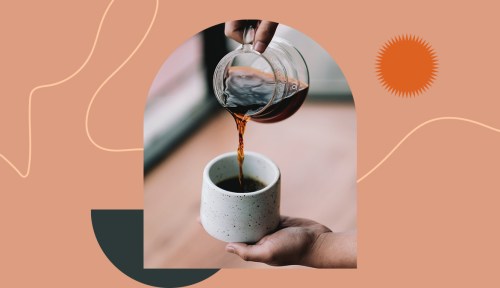Public opinions about caffeine and coffee can change as quickly as the weather; sometimes it’s an excellent antioxidant, sometimes it’s an endocrine disruptor, sometimes it’s good for your memory, or sometimes it’s bad for your mental health. If you’re curious about the nuances and benefits, the most recent episode of The Well + Good Podcast may have some answers for you. Well + Good director of creative development Ella Dove talks (coffee) shop with Caroline Leaf, PhD, a communication pathologist and cognitive neuroscientist; Sahra Nguyen, filmmaker, writer, entrepreneur and founder of Nguyen Coffee Supply in Brooklyn, NY; and Brigitte Zeitlin MPH, RD, CDN, registered dietitian and health coach.
Experts in This Article
registered dietitian and owner of BZ Nutrition
neuroscientist, mental health expert, and host of Cleaning Up The Mental Mess
Sahra Nguyen is an award-winning filmmaker, director, writer & entrepreneur currently based in Brooklyn, New York.
The average adult should aim to have no more than 300 mg of caffeine a day, according to Zeitlin. For context, she says that 100 mg is a shot of espresso, and tea ranges between 50 to 70 mg. A medium (16 oz) latte is about 200 mg. “If someone is having more than 300 mg of caffeine a day, coffee can have negative effects on the body like increase anxiety, higher cortisol levels, and potentially raise your blood pressure.” However, under that limit, coffee can bring health benefits like being an antioxidant, reducing inflammation in your brain, and even improving your mood, according to Dr. Leaf.

How to reap the most health benefits from coffee
So, as Dove asks in the podcast, is coffee good or bad? And, of course, the answer depends. Below, the experts lay out a few caffeine-related guidelines to keep in mind.
1. Stay between the recommended dosage and listen to your body
“Coffee dosage and caffeine intake are fairly idiosyncratic—meaning that everyone responds to it differently,” says Dr. Leaf. Generally, staying below 300 mg is the recommended limit, but you should listen to your mind and body for signs that you’re not feeling well after consuming coffee. Physiological signs of too much caffeine include anxiety, sweating, increased heart rate, or general jitters.
2. Too much might disrupt your hormones
Coffee, according to Zeitlin, can be an endocrine disruptor after about 300 mg of caffeine which means that it can cause changes in hormone levels. The number one hormone that it affects is cortisol, which can raise. High levels of cortisol, the hormone released when you go into “fight or flight” mode, are not great to have in levels because it can cause inflammation and fatigue and also interfere with fertility. If you’re on a fertility journey, Zeitlin recommends keeping your consumption around 100 mg of caffeine per day.
3. Caffeine stays in your body for 24 hours and can affect your sleep
Caffeine stays in the body for 24 hours, so Zeitlin often recommends her clients stop consuming caffeine after 3 pm. Drinking coffee in the morning can be great for your brain function, mood, and energy levels, Dr. Leaf says. However, making sure that you’re reducing your intake 6 to 8 hours before you go to sleep can ensure that your rest isn’t affected.
4. For every cup of coffee, drink a cup of water
Coffee, as you might have heard, is a diuretic. This means that it encourages you to pee more often, contributing to dehydration. Zeitlin recommends that, for every serving of coffee, drinking a glass of water can help make up for its dehydrating effects. Additionally, she recommends drinking tea because caffeinated teas are considered hydrating.
Rituals and routines matter, according to Dr. Leaf. When you have a pattern of behavior, especially with a stimulant that your brain recognizes as energizing and helpful, it makes sense that you crave it. Having a routine is psychologically valuable because it gives your brain a level of familiarity and safety to look forward to, according to Dr. Leaf. At the end of the day, everyone responds differently to caffeine, so what may be suitable for some can be anxiety-inducing for others. Ultimately, though, the benefits are there, along with the fact that it tastes pretty good.
Oh hi! You look like someone who loves free workouts, discounts for cutting-edge wellness brands, and exclusive Well+Good content. Sign up for Well+, our online community of wellness insiders, and unlock your rewards instantly.
Sign Up for Our Daily Newsletter
Get all the latest in wellness, trends, food, fitness, beauty, and more delivered right to your inbox.
Got it, you've been added to our email list.











